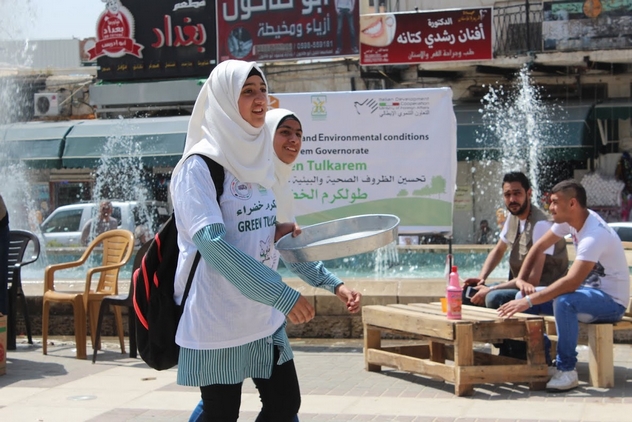Since 2016, the EU is funding a three year project aimed at improving the environment and hygiene conditions of the community of Shu’fat refugee camp, implemented through Cesvi with UNRWA and Overseas. The three main objectives of this project are to strengthen the capacity of stakeholders to operate and manage solid waste, to raise the awareness of the residents on good environmental practices, and to rehabilitate areas for the benefit of the community, for instance by creating “green zones”.
Shu’fat Camp was established in 1966 and stretches over an area of 203 Dunams (around 2 km²) at the north of Jerusalem. Its population counts over 25.000 people, out of which around 13.700 are documented Palestine refugees recognized by UNRWA (who runs the camps), and 12.000 additional residents are Jerusalemites (around 5% of the total population) or West Bankers without refugee status. Although Shu’fat is the only refugee camp within Jerusalem, it is on the Palestinian side of the separation barrier. There are 4 schools in the camp, out of which 2 UNRWA schools, and 7 kindergartens. The 5 main CBO’s are a Women’s Centre, the Youth Centre, a Children’s Centre, a Rehabilitation Centre for People with Disabilities, and a Popular Committee established by the Department of Refugee Affairs (DORA).
The situation in Shu’fat Camp is very volatile, and presents many challenges for its inhabitants in terms of education, youth, employment, domestic violence, substance abuse, and safety. The PA is not allowed to operate in the camp and its surroundings since the Oslo Agreements. Although the area is under the responsibility of the Jerusalem Municipality, Shu’fat Camp is denied municipal services as the Israeli authorities refuse to enter the camp due to alleged security reasons. As a result, the camp’s residents lack access to basic services (such as ambulances, police, firefighters, and improper solid waste management) and are confronted with a raising criminality.
Waste is a main challenge in Shu’fat Camp, and UNRWA is officially responsible for solid waste management in the camp. Solid waste is collected in bins and containers throughout Shu’fat, and brought to a main transfer site near the entrance of the camp (a new site is currently under development). The waste is then transported to dumping sites in the West Bank. However, considering the density of the population, the amount of solid waste daily produced (estimated to 20 to 25 tons and more than 35 tons in the days after weekends, i.e. Saturdays and Mondays) and the fact that surrounding areas also dump their waste in Shu’fat Camp, these services are not sufficient. As a result, solid waste is accumulated in some parts of the camp and burned by its inhabitants. This has serious social and health impacts. Exposed to toxic smoke on a regular basis, Shu’fat Camp residents, and especially children, indeed develop respiratory problems and skin diseases, and suffer from stigma and tensions.
Cover photo – Green Tulkarem: Cesvi worked in the environmental and solid waste management sector in Tulkarem as well.
